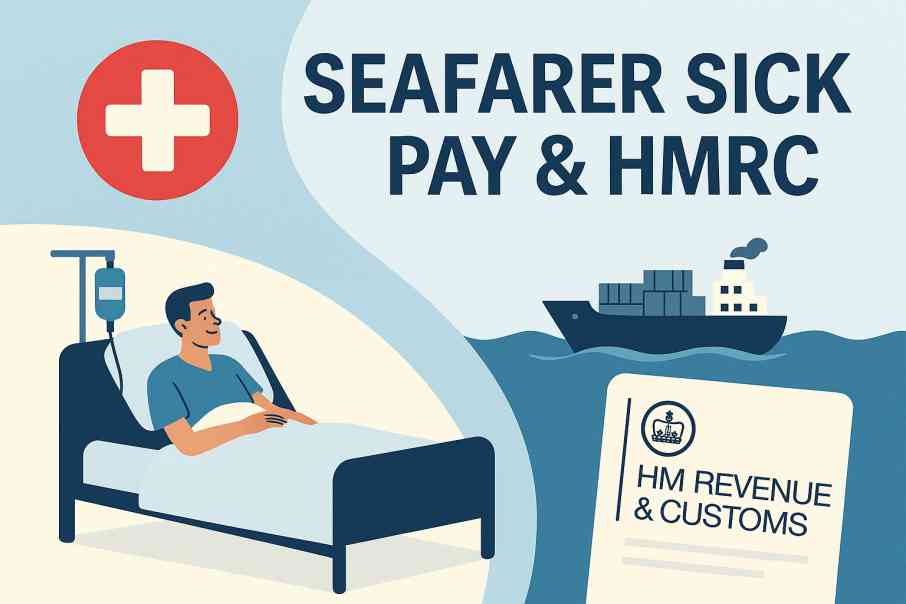How HMRC Treats Sick Pay for Seafarers: What Counts as Taxable?
- Authors
-
-

- Name
- Patrick Maflin
-

For seafarers, periods of illness or injury can raise challenging tax questions. Especially when insurance payouts or employer funded support are involved. Not all income received during medical leave is treated the same by HMRC. Some payments may be tax free, while others are taxed as regular employment income. The deciding factor usually comes down to how the illness arose and who paid the benefit.
This article explains the key distinctions and explores how HMRC determines whether sick pay or insurance income is taxable for seafarers.
Monthly Payments After a Work-Related Injury: Not Always Taxable
In one recent case, a seafarer suffered an injury while on duty offshore and was unable to work for several months. During this time, they received regular monthly payments under a private insurance policy. The income effectively replaced their salary while they recovered. Initially, this income was included on their tax return and taxed in full.
After the individual submitted supporting documents, including the policy schedule and a breakdown of the medical circumstances, HMRC reviewed the case. They accepted that the injury had occurred in the course of employment and that the insurance policy was designed specifically to compensate for work-related loss of income and medical costs.
As a result, HMRC amended the return and issued a full refund of the tax paid on those monthly payments.
This treatment is consistent with the exemptions outlined in the Income Tax (Earnings and Pensions) Act 2003, which allow certain work-related medical or insurance payments to be tax-free. In short, if the sickness or injury is attributable to the duties of the job, and the payment is simply compensating for lost income rather than providing an additional benefit, the income is not taxable.
HMRC makes this distinction clear in its manuals. A classic example involves a footballer: if they are injured on the pitch and their club pays for private medical treatment, it is not a taxable benefit. But if they are injured at home and the employer still pays for treatment, it becomes taxable. The deciding factor is whether the injury arose “in the performance of the duties of employment.”
Sick Pay for Illness Not Caused by Work: Fully Taxable
A different outcome applies when a seafarer is off work due to a condition that has no link to their employment. In these cases, payments made by an employer, or under a group insurance scheme, are generally treated as taxable income.
This is particularly relevant for permanent health insurance (PHI) arrangements. Even though PHI replaces lost income during long-term illness, if the policy is paid for by the employer or
offered as part of a group scheme, the payments are viewed as continuing employment income. Unless there is a clear connection between the illness and the nature of the work, no exemption applies.
The same is true for most employer-funded medical benefits. If the condition is something that could happen to anyone, not specific to the duties of the job, then HMRC is likely to consider any compensation or support taxable.
Key Points to Consider
Whether a sick pay or insurance payment is taxable depends on three things:
· Was the illness or injury caused by the job? If yes, and supported by evidence, the payment may be exempt from tax.
· Who paid the benefit? Payments made by employers or employer-funded insurance schemes are usually taxable unless specifically exempted. Payments from personal insurance policies (i.e., not connected to your job) are more likely to be tax-free.
· What was the payment for? If it was purely to restore you to your prior earning position and health status after a work-related incident, HMRC may not treat it as a taxable benefit. But if the payment offers extra support not tied to job-related risks, it is more likely to be taxed.
What Should Seafarers Do?
If you’ve received income during a period of illness or injury and are unsure about its tax treatment, it’s important to:
1. Keep clear documentation — including the original policy and evidence of how the injury or illness arose.
2. Declare the income in your Self Assessment return to avoid non-disclosure issues.
3. Seek professional advice if the circumstances suggest an exemption may apply.
4. Request a review if needed — HMRC may amend a return if you can show that the payment meets the criteria for exemption.
Final Thought
For seafarers, the risks of offshore work often mean that insurance cover and medical support are essential. But the tax treatment of these benefits is not always straightforward. Understanding whether your illness or injury is classed as job-related, and whether your insurance policy was funded privately or by your employer, can make all the difference.
If you’re unsure how your medical leave income should be treated, get in touch with our team. We can help you ensure your tax return is accurate, and that you’re not paying more than you need to.


